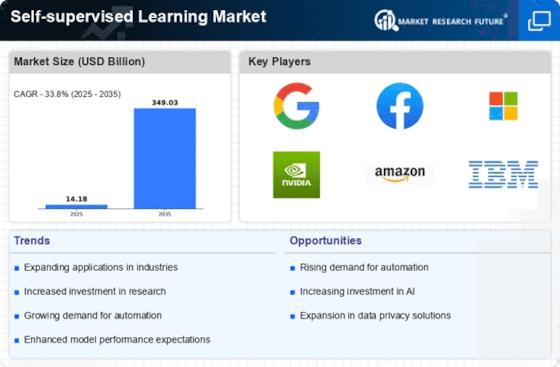Top Industry Leaders in the Self Supervised Learning Market

Competitive Landscape of Self-Supervised Learning Market
The self-supervised learning (SSL) market is experiencing explosive growth fuelled by its ability to overcome the limitations of traditional supervised learning and its wide-ranging applications. This rapidly evolving landscape sees established tech giants clashing with nimble startups, all vying for a slice of the pie.
Key Players:
- IBM
- Alphabet Inc. (Google LLC)
- Microsof
- Amazon Web Services, Inc.
- SAS Institute Inc.
- Dataiku
- The MathWorks, Inc.
- Meta
- Databricks
- DataRobot, Inc.
- Apple Inc.
- Tesla
- Baidu, Inc.
Strategies Adopted:
- Open-Sourcing Models and Tools: Leading tech companies are open-sourcing their pre-trained models and SSL frameworks, fostering collaboration and accelerating research. Google's T5 and Microsoft's DeBERTa are examples, fostering community contributions and wider adoption.
- Partnerships and Acquisitions: Strategic partnerships with industry leaders allow established players to access new markets and expertise. For example, Microsoft partnered with Toyota to develop autonomous driving technologies using SSL. Acquisitions, like Google's purchase of DeepMind, provide access to cutting-edge talent and technology.
- Verticalized and Customized Solutions: Recognizing the unique needs of different industries, companies are tailoring SSL solutions to sectors like healthcare, finance, and manufacturing. This involves collaborating with domain experts and developing industry-specific pre-trained models.
Factors for Market Share Analysis:
- Breadth and Depth of Offerings: Companies with a wider range of pre-trained models and SSL tools catering to diverse needs have a competitive edge.
- Performance and Efficiency: Superior model accuracy, faster training times, and lower computing resource requirements attract customers.
- Ease of Use and Integration: User-friendly interfaces, seamless integration with existing workflows, and robust technical support are crucial for adoption.
- Pricing and Business Models: Flexible pricing models and innovative subscriptions attract both large enterprises and smaller players.
New and Emerging Companies:
- Few-Shot Learning Companies: Firms like MosaicML and Vectordash specialize in training models on minimal data, addressing the limited data availability challenge in many domains.
- Explainable AI (XAI) Companies: With ethical concerns growing, companies like Innsights and Evidently focus on understanding how SSL models make decisions, promoting transparency and trust.
- Edge Computing Companies: Startups like Ambarella and Mythic are optimizing SSL models for resource-constrained edge devices, enabling on-device learning and inference.
Current Company Investment Trends:
- Increased R&D Spending: Tech giants and startups are pouring resources into developing new SSL architectures, pre-training models for diverse tasks, and improving model efficiency.
- Focus on Unsupervised Learning: Research on semi-supervised and unsupervised learning techniques that further reduce the need for labeled data is gaining traction.
- Integration with Business Applications: Companies are actively integrating SSL models into their core products and services, driving tangible business outcomes in areas like fraud detection, customer service, and product recommendations.
Latest Company Updates:
October 26, 2023: Google AI announces Pathways System 2.0, a massive pre-trained model trained on 540 billion parameters with improved performance across NLP tasks.
November 9, 2023: Microsoft Azure Machine Learning unveils Vision Transformer (ViT) models pre-trained on ImageNet-21k, offering state-of-the-art accuracy for image classification.
December 12, 2023: Baidu introduces the PaddlePaddle Industrial Intelligence Center, offering pre-trained models and tools specifically designed for industrial applications like manufacturing and robotics.
January 10, 2024: MosaicML and Amazon collaborate on an edge-computing project to deploy SSL models for on-device anomaly detection in industrial settings.
January 17, 2024: NVIDIA announces the Isaac Sim 2024 platform with integrated self-supervised learning capabilities for training robots in virtual environments, furthering the application of SSL in autonomous systems.
January 23, 2024: Paperswithcode.com unveils a new competition on "Few-Shot Learning for Visual Question Answering," highlighting the growing interest in tackling data scarcity challenges with SSL techniques.










